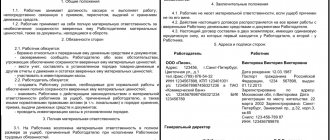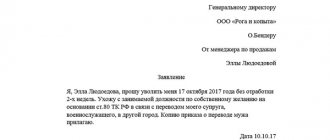Author of the article: Roman Gavrilov Last modified: January 2021 29667
When concluding an employment contract, trust between the employee and the employer is assumed and is rarely specified in a separate clause. Legal relations of an official nature are subordinate and assume that the employee follows legal orders, the order of the head of the enterprise or department. The legality of the actions of the parties to labor relations is justified by the Labor Code of the Russian Federation, special regulations of a general and local nature. Dismissal under the article “loss of trust” is permitted in exceptional cases.
Procedure for dismissal due to loss of confidence
To avoid negative court decisions, we will provide a step-by-step procedure for dismissal due to loss of trust. In the event of a trial, the court will necessarily verify the correctness of the application of the disciplinary sanction.
Step 1. Recording the offense
It is drawn up in the form of a report or memo addressed to the general director of the organization in free form. This document indicates a fact about the possible (since it has yet to be proven) commission of an unlawful act by a specific person or generally describes the fact without specifying specific persons. The document must contain the following data:
- Name;
- date and number;
- FULL NAME. and position, to whom they write and who addresses;
- signature.
In addition to the above, the document must clearly, understandably and unambiguously state specific facts (not guesses).
Step 2. Proceedings
Draws up an order for the main activity.
Purposes of the order:
- appoint a commission to investigate a specific fact;
- indicate the time frame for the investigation;
- determine the amount of damage;
- identify the persons involved in the commission of the offense;
- identify and describe the causes and conditions that contributed to this violation, etc.
During the internal investigation, written explanations must be obtained from the employee whose activities constitute an offense, or a refusal to provide them must be received (without this stage, the dismissal will be considered unlawful).
The employee has 2 working days to provide an explanation.
The employer records the absence of an explanation in writing.
IMPORTANT!
The absence of an employee's explanation does not prevent the imposition of a disciplinary sanction on him.
Step 3. Presentation of results
The results are drawn up in the form of a multi-page document, which may be called “Conclusion on the results...” or “Act” and even have references to the sheets of the case that was formed as a result of the investigation.
The formalized results of the proceedings are sent to the General Director for approval. If the commission believes that guilt in the employee’s actions has been proven, it writes (in a recommendation form) that the person should be fired for loss of trust.
The General Director, in turn, may or may not agree with the opinion of the commission.
If he is satisfied with the opinion of the working group, he approves the conclusions and proposals of the commission by writing a resolution or his signature in a specially designated place.
If the group’s opinion does not suit him, he has the right to make his own decision (not in terms of argumentation, but in terms of the consequences for the culprit) based on current expediency - replacing dismissal due to loss of trust with a reprimand, for example.
Step 4. Termination of the employment contract
Dismissal is formalized by order using the standard unified form T-8.
When drawing up such an administrative document, it is necessary to take into account a number of factors.
The administrative document must be issued no later than:
- 1 month after the discovery of the offense. During this period, periods associated with the employee’s illness shall not be included;
- being on vacation (according to Resolution No. 2 of the RF Armed Forces of any kind);
- absence of an employee for other reasons, including the use of rest days;
The day by which to count the period, that is, the date of discovery of the violation is the one on which the employee’s manager received information about the misconduct. Therefore, adherence to time frames is extremely important in this process.
Dismissal due to loss of confidence (Clause 7, Part 1, Article 81 of the Labor Code of the Russian Federation) due to guilty actions performed by an employee not at the place of work or at the place of work, but not in connection with the performance of a job function, is possible no later than 1 year from the date when the employer was notified of the violation.
When formulating the grounds for termination of the employment agreement, the employer must provide wording regarding loss of trust under clause 7, part 1, art. 81 Labor Code of the Russian Federation.
When citing in the administrative document the grounds that serve as confirmation of the fact of a violation, it is necessary to make a reference to the details of the relevant papers.
Dismissal process
Algorithm for the dismissal procedure
In order for an employer to fire an employee who has lost confidence, you can use the following algorithm of actions:
- Drawing up a report by the employee who noticed the violation. State the reasons for dismissal clearly and concisely.
- Formation of a commission based on the observed violation.
- Work of the commission. Members of the commission must establish the facts of what happened, thoroughly review the evidence, recalculate the availability of material assets and determine what is missing. Evidence of guilt must be found and presented to the accused.
- Preparation of a report based on the results of the work of the commission members. Record the document in the prescribed form.
- Familiarize the employee who committed the violation with the Act.
- Terminate the employment agreement unilaterally.
- Preparation of an administrative document for dismissal from the enterprise. Moreover, there is no need to demand any explanation from the employee.
Arbitrage practice
In cases of dismissal due to loss of confidence, judicial practice is quite diverse. For example, there is a decision of the Arkhangelsk Regional Court dated May 16, 2002 in case No. 33-1411, in which dismissal for the specified circumstance for violation of cash discipline was recognized as justified (shortage).
Violation of the procedure for issuing material assets by the responsible person was also recognized by the Ryazan court on November 29, 2006 in case No. 33-1699 as sufficient grounds for dismissal.
Common to all court decisions on this issue are:
- guilty actions of the responsible person;
- compliance with the procedure for bringing to disciplinary liability in the form of dismissal.
The absence of at least one of these provisions will give grounds for the court to decide that the dismissal for lack of confidence in the employee was made unreasonably.
The procedure for establishing facts of violations by a civil servant
Facts of violation by a civil servant of the prohibitions and restrictions determined by the current federal legislation are established on the basis of an internal audit.
The procedure for conducting an internal audit is regulated by Art. 59 FZ-79. The inspection is carried out by a special division of the government agency for civil service issues (with the participation of the legal department and the trade union) based on a written application from the civil servant or a decision from the employer’s representative.
An official check of a civil servant is carried out taking into account the following features:
- A civil servant who is directly or indirectly interested in its results cannot be involved in the inspection.
- During the inspection, inspectors establish the fact that a civil servant has committed an offense, taking into account the reasons and conditions that influenced the violation committed, as well as the nature and extent of the harm caused to the civil servant as a result of the violation committed.
- During the inspection, a civil servant may be suspended from performing the functions assigned to him.
- During an inspection, a civil servant has the right to give oral and written explanations regarding actions he has committed that qualify as violations.
The results of the inspection are documented in writing and are subject to notification to the civil servant.
Register of persons dismissed due to loss of trust
Since January 1, 2018, Russia has maintained a register of persons dismissed due to loss of trust. This innovation was approved by Federal Law No. 132 of July 1, 2017. According to this norm, Federal Law No. 273 of December 25, 2008 was supplemented with a new article number 15. The article states that the register will include information about persons who committed corruption offenses, as a result of which they were fired due to loss of trust.
The provisions of the law are applicable if:
- the employee did not provide for or take measures aimed at preventing or resolving a conflict of interest to which he is a party (this setting is applicable if the situation is reliably qualified as a conflict of interest);
- the employee provided incorrect information about income or property (both his own and his spouse’s or children’s).
Employees with whom the employment agreement is terminated due to loss of trust are established by 273-FZ. Moreover, employment relationships can be terminated with employees holding certain positions if they (their spouses, children):
- own accounts in banking organizations outside the Russian Federation;
- keep cash in banking organizations outside the Russian Federation;
- have or use foreign financial resources.
The data is publicly available on the Internet. They are included in a special register posted on the civil service portal in the appropriate section.
The information is relevant primarily for government officials - state and municipal, customs officers, military, prosecutors, etc.
Information about offenders will be kept in the register for five years. However, the law stipulates cases in which such information may be excluded from the register:
- cancellation of the act that is the basis for including information about a person dismissed due to loss of trust in the register;
- entry into force of a court decision to cancel the act;
- expiration of the five-year storage period for information about the offender;
- death of the offender.
Candidates for termination of employment contract
Management has the right to express distrust only to responsible employees. That is, for those who hold leadership positions or directly deal with servicing commodity or monetary values. For example, it is acceptable to no longer trust the honesty of an accountant or salesperson, but it is not acceptable to part ways with a locksmith or plumber for this reason. And there are no subjective aspects in this - everything is clearly stated in clause 7, part 1, art. 81 Labor Code of the Russian Federation. But such employees cannot be fired for loss of trust in some situations. For example, severing an employment relationship with a pregnant woman (Article 261 of the Labor Code of the Russian Federation) or a minor employee (Article 269 of the Labor Code of the Russian Federation). True, it is still possible to fire a minor if he has committed theft; in addition, it is forbidden to enter into agreements with a minor on full financial responsibility. In addition, employees who are on vacation or sick leave have immunity, but only until their end.
What to write in a work book
An entry is made in the main document about the employee’s length of service with reference to the relevant article of the Labor Code of the Russian Federation.
Similar information is entered into the employee’s personal card, in which he must sign.
Thus, dismissal on the grounds considered is a type of disciplinary sanction. When using such an algorithm, the employer must strictly comply with the procedure specified in Art. 193 Labor Code of the Russian Federation. Only in this case will the dismissal of the employee be legal.
However, if an employee has committed actions unrelated to his work activity that give rise to a loss of confidence in him, such dismissal is not a type of disciplinary action (Part 3 of Article 192 of the Labor Code of the Russian Federation, Clause 2 of Resolution of the Plenum of the Armed Forces of the Russian Federation No. 2). This means that it is not necessary to comply with the algorithm for bringing to disciplinary liability and imposing penalties defined by the Labor Code of the Russian Federation.
Penalty measures in the civil service
The procedure for regulating labor relations in the public service is regulated by Law No. 79-FZ of July 27, 2004 “On the State Civil Service in the Russian Federation.”
Based on Art. 59.1 Federal Law-79 the following penalties may be applied to a civil servant:
- comment;
- rebuke;
- warning about incomplete job compliance.
The basis for the application of penalties is the violation by a civil servant of the conditions and restrictions established by the current federal legislation, as well as failure to fulfill obligations in terms of combating corruption.
Employer's liability
If an employment agreement is terminated due to loss of trust with an employee who has nothing to do with monetary and material values, the latter has the right to file a civil claim to declare the dismissal due to loss of trust illegal. In this case, the court may side with the employee and require measures to be taken to restore him.
Moreover, the employer, represented by the head of the company, will have to (Articles 237, 394 of the Labor Code of the Russian Federation):
- pay the employee for the period of forced absence based on average earnings;
- compensate for moral damage.
If an employee contacts the labor inspectorate, the employer may face a fine under Part 1 of Art. 5.27 Code of Administrative Offenses of the Russian Federation in the amount of:
- 30,000–50,000 rubles - for a legal entity;
- 1000–5000 rubles - for individual entrepreneurs and officials.
Payments and compensations
Dismissal based on loss of trust does not deprive the employee of any payments that are due upon termination of the contract. He should be given:
- Salary.
- Compensation for unserved vacation.
- Other amounts specified in the law, labor and collective agreements (Article 140 of the Labor Code).
But if the culprit causes material damage, the employer can cover it from the offender’s salary within a month from the moment the size and amount of damage is recorded. In this case, compensation (if it is not more than the average monthly salary) is withheld from the dismissal pay (Article 248 of the Labor Code). But it will not be possible to recover lost profits from him.
Documentary recording of employee unlawful actions
There is no universal document form for recording such offenses. Therefore, enterprises usually draw up a memorandum in which they indicate:
- surname, name, patronymic of the person who discovered the violation;
- the circumstances under which the actions were performed or their consequences were discovered;
- date and time of discovery of the act or its result.
- a commission of 3 or more employees competent and disinterested in the result of the investigation is created;
- an order is issued on the formation of a commission indicating: the names of the participants, the positions they occupy, the date of formation of the commission, the purpose, period of validity, the powers of the commission members (if they are not fixed by a special regulatory act of the organization).
Members of the commission are required to familiarize themselves with the order in writing.
An internal investigation commission is also formed if there was no damage to property, but the employee’s actions could lead to it. Tasks of the commission:
- determination of the circumstances of damage - time, place, method;
- description of the property damaged;
- calculating the cost of damage;
- identifying those responsible for causing damage;
- collecting facts about the case under investigation;
- establishing the degree of guilt of a person, the type of punishment;
- storage of materials related to the case under investigation.
The actions of the commission members and the information obtained during the investigation are recorded in special documents (acts, certificates, memos). At the end of the commission’s activities, a special act is drawn up, which is signed by all participants. The employee against whom the investigation was conducted must be familiarized with the report. His employee refuses to sign the document, then an appropriate note is made about this.
Conducting an internal investigation does not prevent contacting law enforcement agencies, but in order to dismiss for loss of trust, it is sufficient to reveal the employee’s guilt during the investigation.
How and when to make an order?
A single act of absence from work without justifying reasons can provoke the dismissal of an employee for absenteeism. However, you should not rush to place your order. Even in an ideal case, the process will take at least 5 working days:
- Day of absenteeism.
- The date of the employee’s appearance and the issuance of a written order to give explanations.
- Two days to provide excuses.
- Date of dismissal (issue of order).
In this case, you can play it safe and send the hired person a letter (registered with an inventory) demanding him to appear to clarify the circumstances. If there is no response and the shipment is returned, management will be able to confirm their attempts to find out the fate of their employee and the validity of the decision. But even such precautionary behavior will not guarantee protection from inspections and court.
The law does not provide a special form for processing payments for gross misconduct. The personnel service can use the standard T-8 form. However, when filling out the order column, you need to disclose in as much detail as possible the reason for the calculation (“for absenteeism”), refer to paragraphs. a) paragraph 6) art. 81 TC, and also list all applications.
It is another matter whether the date of issuing the order and the termination of the employment contract coincides in the event of a long trial and refusal to appear at the enterprise. The safest option is to specify one day for dismissal and signing of the order, and simply not pay for the missed days.
The most offensive thing for the employee is that the impartial wording about the reason for termination of relations with the employer will be exactly transferred from the order to his work book. In addition, the following must be entered in the document confirming the availability and duration of experience:
- next record number;
- date of termination of cooperation with the employer;
- reason for the calculation and reference to the Labor Code of the Russian Federation;
- details of the order (instruction) on dismissal.
The correctness of the entry must be confirmed with a “wet” seal and signatures of the manager and employee.
Statute of limitations
For disciplinary offenses that caused these extreme measures, certain statutes of limitations are provided:
- 1 month from the date of discovery of the offense;
- 6 months from the date of commission of the offense, not counting the time of criminal proceedings;
- in the case of an audit of financial and economic activities, 2 years from the date of commission;
- 1 year from the moment the employer became aware of the commission of an act outside the place of work.
Time of illness or vacation is not included in this period. Any person has the right to appeal his dismissal in court.
Legal documents
- Article 81 of the Labor Code of the Russian Federation
- Art. 261 Labor Code of the Russian Federation
- Art. 269 Labor Code of the Russian Federation
- Art. 244 Labor Code of the Russian Federation
- Resolutions of the Plenum of the Supreme Court of the Russian Federation dated March 17, 2004 No. 2
- Article 192 of the Labor Code of the Russian Federation
- Art. 193 Labor Code of the Russian Federation
- Resolutions of the Plenum of the Supreme Court of the Russian Federation dated March 17, 2004 No. 2
Consequences for the employee
The head of an enterprise, having lost confidence in an employee, can quite legally apply the following disciplinary measures:
- Making a remark is the most loyal method of punishment
- Reprimand - medium punishment
- Make a monetary recovery of the stolen amount or goods and materials
- Dismissal is an extreme form of punishment
A verbal reprimand and reprimand will have the most favorable effect on the employee. In written form, such methods of influence will be more effective, which will reduce the likelihood of repetition of the offense.
Based on practical situations, it is advisable to document all actual misconduct by employees. Save the memo and request a written explanation. This will help defend the employer’s right in the event of an employee’s appeal to the courts and avoid penalties.
An entry in the work book about dismissal due to loss of trust for employees will entail a lot of unpleasant consequences:
- Your work experience will be interrupted
- A person will not be able to receive unemployment benefits for 3 months
- It will be impossible to hold leadership positions
A direct ban on holding certain positions applies mainly to civil servants. For commercial enterprises, there is no mechanism by which, for example, a thieving cashier will not be able to get a job in another store. But in practice, it will be difficult for him to find a new place to realize his capabilities and talents. Firm owners will be wary of a candidate with a notice in his employment record of dismissal due to loss of trust. You can prepare for constant refusals.
Why is it better to resolve the situation peacefully?
A person convicted of committing a serious disciplinary offense with further dismissal is always interested in changing at least the wording in the order. However, the employer himself may be interested in agreeing to a settlement.
In order not to add complications to itself, management can offer a more acceptable, quick and painless way of separation - by agreement, Art. 78 TK. The main advantage is the irreversibility of the decision made. This means that the former employee will not be able to demand restoration of relations in any form, as well as declare the illegality of the actions of the company’s management.
How to fix the bases
Dismissal due to loss of confidence is a set of actions that must be strictly followed in order to avoid violation of labor laws.
If an employee has committed actions related to the performance of job duties, his dismissal is a disciplinary measure. When terminating an employment relationship on this basis, it is necessary to strictly follow the disciplinary procedure established by the organization, including deadlines.
The manager must require a written explanation from the employee. The form of explanation is not established by labor legislation. If the employee is ready to write an explanatory note, there is no need to require him to give an explanation in writing. If the situation is conflicting, then the notification must be issued in writing and handed to the subordinate against signature. If you refuse to sign, a document is drawn up.
The legislation gives the employee two working days to provide explanations. The period is counted from the date following the day the claim is submitted.









